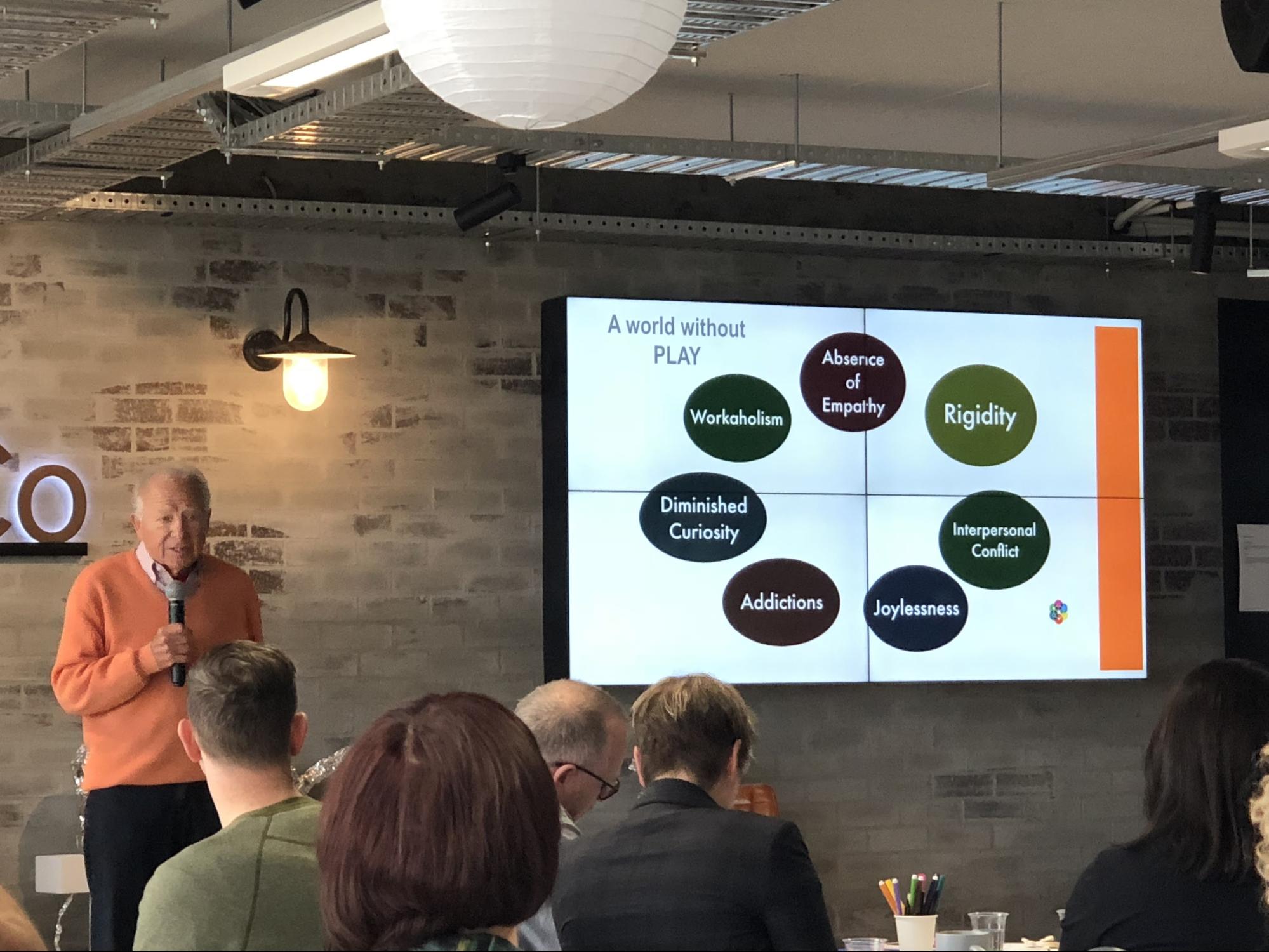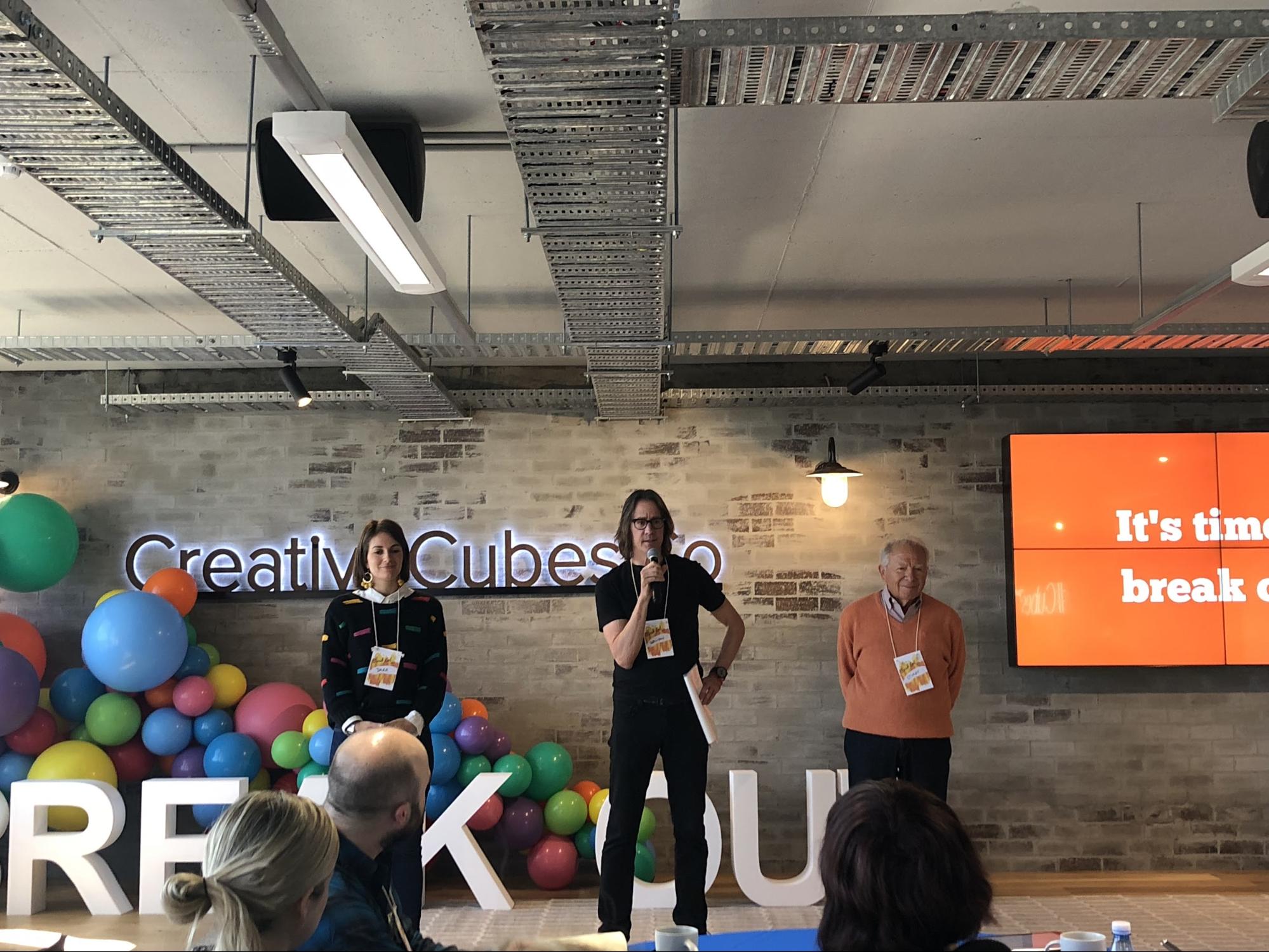The action of playing is known to be an essential part of our lives when we’re developing our brains as kids; what I did not realise is that play is crucial for our development and that humans are supposed to keep playing for their whole lives.
Last week, I had the pleasure to watch two of the world’s heaviest players in the “play” field, Dr Stuart Brown and Brendan Boyle, in a course dedicated to “play”.
Ok, here comes the story, but before that, let me try to explain why in the heck I invested three days of my life focused on playing.
“Play” is known in the design and innovation world because it helps us to be more creative, to lower our preconceptions and to be open for experimentation. No one is ever 100% confident in a new idea, so when creating new solutions and new ways of doing business, we need to open ourselves up for play in order to make creativity and innovation to flow.
BOOM!
Everything started here. “Play” has been studied scientifically by Dr Stuart Brown who is a psychiatrist. Initially, studying the action of playing wasn’t his main objective; this changed when he noticed what the “lack of play” did to someone’s life, which made him realise how “play” is essential for a human being’s development.
“In 1966, Dr Stuart Brown was asked by Governor Connelly to be on the Fact-Finding Task Force as a consulting psychiatrist for the Charles J. Whitman Texas Tower case. This case involved Charles Whitman, who killed his wife and mother and then climbed the Texas Tower where he killed another 17 people and injured 41. Dr Brown found that Charles Whitman’s father was overbearing and had abused and deprived Charles of play throughout his childhood.
It was as a result of this study in which he analysed young male murderers that he went on to discover the importance of “play”. Through his continued research and interviews with 8,000 people about their “play profile”, Brown concluded that people who played were usually successful and people who had play deprivation had dangerous long-term consequences.”
(Source: https://www.pgpedia.com/b/stuart-brown)
PLAY DEPRIVATION
Dr Stuart Brown believes that play deprivation can have severe consequences like sleep deprivation. “A close look at the biology and neuroscience of play reveals it to be a fundamental survival aspect of all social mammals, with measurable negative consequences in controlled laboratory settings that limit or deter animal play behaviour. The linkages from the objective findings in animal play deprivation to the clinical findings in humans are, as yet unproven. However, the subcortical physiology and anatomy are similar, and the inability to play deprived animals to deter aggression, or to socialise comfortably with fellow pack members is demonstrable. The remediation of these socialisation deficits in the animals by inclusion of play in developmentally appropriate forms reveals the effectiveness of play as a means of achieving more social normalcy and non-violent alternatives in the playful social mammal domains.”
(Source: http://www.nifplay.org/blog/play-deprivation-a-leading-indicator-for-mass-murder/)
PLAY MATTERS
What does “play” mean to you? The pleasures of play are endless; could you even imagine a life without “play”?
“Play” offers benefits such as trust-building, empathising, optimism, flexibility, openness, enjoying the moment, persevering, building emotional regulation and resilience, exploring the possible, cognitive development and developing a sense of belonging.
Dr Stuart Brown mentions in his book, “When we stop playing, we stop developing, and when that happens, the laws of entropy take over – things fall apart. “
The funny thing lies in thinking on the opposite. As Dara Simkin, Project Play founder and event organiser says: “Would you like that your business or your life to be based on disbelief, apathy, negativity, rigidity, misery and weakness? (The opposite of play)”. If your answer was “no”, you probably can benefit from introducing “play” to your context.
In business, we often tend to block “play” because it can lead to silliness or time waste, however, when we’re missing “play”, we can also be missing all the factors that can contribute for creativity and innovation. In life and business, “when we stop playing, we start dying” – Dr Stuart Brown on his book “PLAY”.
I GET IT, PLAY IS IMPORTANT. HOW CAN WE BRING PLAY TO BUSINESS?
“Play” is broad, and different companies will have different “play personalities” or types of “mixed play personalities”.
An excellent way to start playing is thinking about your company’s space. “Space is the body language of a company” Brendan Boyle, a partner at Ideo, a professor at D.Schoo and co-host of a “PLAY” course in Stanford with Dr Stuart Brown, said.
“Play” is a necessity for creativity; it feeds and fuel innovation. Companies can also suffer from play deprivation and, although there is no scientific research yet to prove the effects, we know the consequences too well: companies, a lot of the times, are profoundly hierarchical, processual, dull and static. You probably know right away if you have been deprived of “play” in your professional practice.
Boyle says the best way to start pushing “play” is through the company’s values and practices. It’s about changing the business culture.
If you’re also from either the innovation or design worlds, you’re more used to the “play” atmosphere. If you’re not, “play” can be pretty daunting. In our design thinking workshops, I sometimes see some horrified faces when we start a creative (and playful) workout. At first, it sounds silly, because you have to make yourself vulnerable, but after a while, the ones who were most worried are the ones who are embracing and enjoying “play” the most. Magic happens when people start to open up, to be more empathetic, more experimental, and, then, they begin to create incredible solutions. What I now know is that what sounds like magic is the evidence of “play”.
“Play” is an activator for flow moments that are counter-intuitively very productive and focused moments, the opposite to what you would typically think about playing.
LET’S GET PRACTICAL
Here are few lessons from Brendan Boyle about building a culture of innovation (through play):
- Learn from failure
“Fail fast to succeed sooner” is a mantra from Ideo, you also need to do an autopsy from failure so that you can make it always better. Another tip is to resource “likes” and “wishes”; in our courses, we always end with an “I like, I wish” session where we learn from our participants what worked and what could be better (we learned this method in D.School).
- Talk less and do more
Don’t overthink, start doing. Thinking can happen in your whole body, not only in your brain, so prototyping and making stuff is helpful. A prototype can also create engagement which is crucial when creating change.
- Collaborate
Ask, co-create and engage. Make sure you’re making others feel successful as well.
- Be Optimistic
There’s a big difference in being childish and childlike. Being optimistic and playful does not mean that it can’t be serious.
WE DON’T ALL PLAY THE SAME
It is helpful to understand your “play personality” and your company’s “play personality”. We don’t all play the same. So, if you’re looking for creating a more playful and innovative culture, read Dr Brown’s book on PLAY.
To sum up, to play is deeply connected to the Design Thinking practice, as illustrated by Boyle. Just as a “play” session, Design Thinking is capable of unleashing the best creative potential on a team, opening the space for experimentation and perseverance, while having joy at work, generating incredible results for businesses.
P.S.: I would like to acknowledge the fantastic team who organised this event and, like myself, are playful creatures: Dara Simkin and Daniel Teitelbaum from Project Play, Fiona Triaca from Naked ambition, and Myles Tehan from Hack Days Australia – thank you!
—
Feeling inspired? Share this post on social to keep the conversation going!
If you’d like to start an innovation journey in your company, you can check out our in-house course offering as well as download for free our Design Thinking toolkit by clicking here.
If you’d like to see what are the upcoming courses in your region, visit our website.
If you have a special project and would like to use Echos’ consultancy services, you can send us an email.




